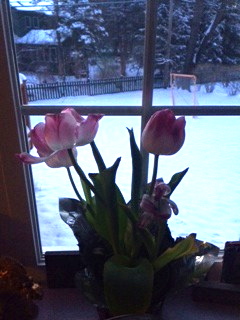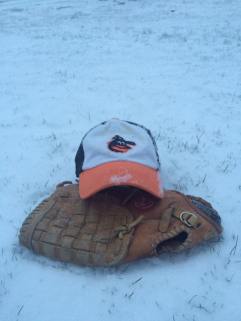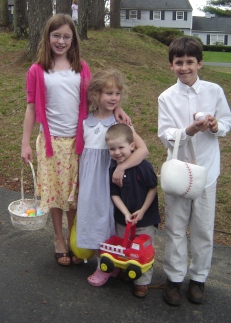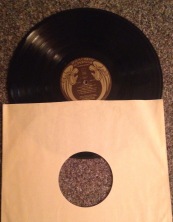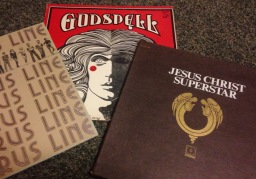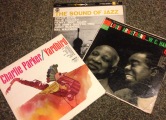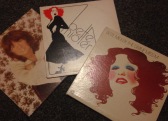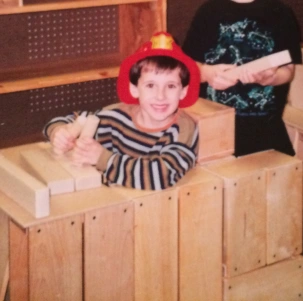
(written 3/23/2003, for Danny’s 7th birthday)
How many parents remember their child’s second day of kindergarten more clearly than their first? For parents who sent a child off to school for the first time in the fall of 2001, this may be the case. I know it is with me.
Typically, it is the first day of school that is etched so permanently into our minds. Parents harbor secret dreams and put forth high expectations as they try to combat separation anxiety and their fear of the unknown. They do this as they try to shake the sense that time marches by much too quickly.
My son Danny’s first day in kindergarten was marked with all of these emotions. When I close my eyes, I can still replay our hug just inside the school door as I dropped him off. Before he turned away, I kissed his hand, a parting ritual from a favorite picture book of his. It was Danny’s way of knowing that if he needed reassurance during the day, he could get it simply by touching his hand to his face.
He didn’t know it, but I watched him for a while after we parted. I watched him to make sure he found friends in the crowd, to make sure he settled in, to make sure he was happy, to make sure he was safe. I was lingering because I wanted to soak up everything. I was letting my son go, in more ways than one, that day. It seemed like our lives had irreversibly changed. As I drove away that sunny fall morning, I hoped for the best and thought, “He’s going to be okay.”
And he was. He absolutely loved his first day of school. His future never seemed brighter.
Just a day later, though, I wasn’t so sure. Danny’s second day in school was September 11th.
We didn’t know it at the time, but his first day of school was also the last day of what we would know as normal. I went from hope for my son to despair for our world within twenty-four hours. Looking back, two years later, his second day of school is the day I remember most.
Much has been written about the impact of that day. I spent most of it grieving for those lost in the terrorist attacks, as we all did. I spent part of the day pondering the momentous nature of things that suddenly and swiftly were changing my son’s world. I remember thinking that Danny would grow up in a world totally different than the one I had been raised in just a generation ago.
After leaving work on the afternoon of September 11th, I met my wife and kids at our friend Betsy’s house. It was comforting to be with family and friends after spending my working hours dazed and confused and scared. Betsy had a daughter starting kindergarten too, and we fell into a conversation about what the world was like when she and I had started school.
I lamented the fact that the world had deteriorated so much in those thirty years. I imagined our world as a much more peaceful one back then. I thought the good old days were gone, and I figured they were never coming back.
It was difficult not to get caught up in the doom and gloom. There was a sense that nothing good could come to Danny’s generation now. An absolute darkness had gathered at the edges of their existence. Unspeakable fear and anxiety would now tarnish everything they knew. I was convinced that Danny would be raised in a world filled with fear, terror, hatred and mistrust.
Two weeks before I entered kindergarten in the fall of 1969, the sixties came to a symbolic close with the Woodstock Music and Art Fair in Bethel, New York. I thought of the sixties a lot in the days that followed September 11th, as I longed for the simpler, more peaceful world of my youth.
But as I began to look closer and closer at the reality of my early school years, I found myself losing my rose-colored glasses for the past. And at the same time, thankfully, the pessimism I held for Danny’s future disappeared as well.
When I looked for events other than Woodstock to serve as a context for 1969, what I found wasn’t all peace, love, and understanding. The half-million concert goers in the dairy fields of upstate New York were not the only youth in the news at the time. Less than a week before Woodstock, the Manson Family committed the Tate-LaBianca murders in Los Angeles. Later on that year, and farther up the coast, a young rock fan was murdered by a member of Hell’s Angels at the Stones’ concert in Altamont. And half a world away, half a million U.S. troops waged war in Vietnam.
My prior thinking had been short sighted and flawed. Was I really a more loving kindergartener when I focused on the huge crowds gathered in the name of peace, love and music a couple hundred miles from my elementary school? What if I had considered the kindergarten class of 1969 within the context of the hateful crimes that took place in California during the latter half of that year? Would that approach have made us seem like a more violent bunch of five year-olds?
I realized that my thinking was just as skewed when I first considered the impact of September 11th on my son. Was his elementary school suddenly filled with fear and hatred because terrorists enacted their awful plans in nearby New York City? Did the terrorists who attacked the United States doom his generation to death, despair and destruction?
In the immediate aftermath of September 11th, as I projected my adult fears onto my son’s future, it was difficult for me to think otherwise. But my close inspection of history in the weeks that followed helped me to see things more clearly. And in the months since then, it’s helped me keep my adult worries from affecting my son’s worldview.
If I grew up happy and content in a less than perfect world, then I know my son can too. In the end, I hope that Danny and his friends in the kindergarten class of 2001 are no more personally affected by the events of September 11th and the war on terrorism than I was by the war in Vietnam.
And here we are today, with the United States waging war in Iraq. I believe that all is not lost, though. When it’s dark enough, you can see the stars, as the saying goes.
It doesn’t matter that the events of Danny’s second day of school will stick with me more vividly than those of his first. It is the very brightness of that first day that will forever cut through the darkness of the second.
So…what can we do to help Danny’s generation face the future in these uncertain times? I think we should do exactly what we did on their first day of school: focus on our dreams, put forth high expectations, help them feel settled, happy, and safe. Try not to dwell too long on our anxieties and fears.
All we can really do is hope for the best, help them find friends in the crowd, and keep right on thinking, “They’re going to be okay.”
